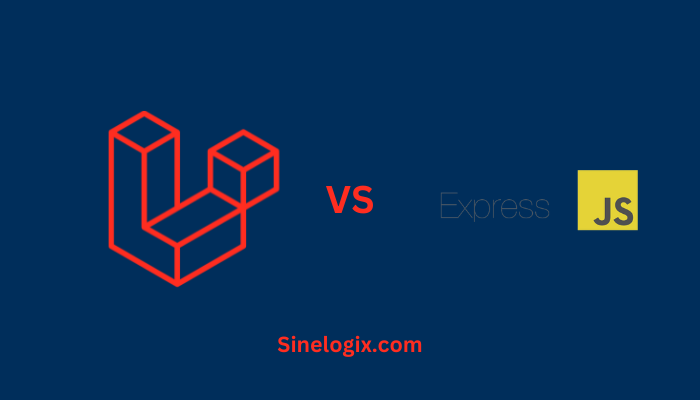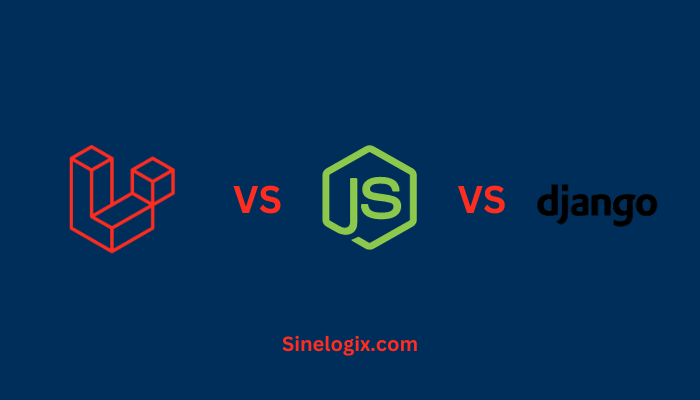In the dynamic landscape of web development, the choice of a backend framework is akin to laying the foundation for a digital skyscraper. Two prominent contenders, Laravel—a robust PHP framework—and Express.js—a minimalist Node.js framework—stand out as compelling options.
In this exploration, we’ll dissect the strengths, weaknesses, and nuances of Laravel and Express.js, offering insights to empower developers in making informed decisions for their projects.
Overview of Laravel and Express.js:
Laravel:
Laravel, written in PHP, stands out for its elegant syntax and developer-friendly features. Following the MVC architecture, Laravel facilitates organized code and rapid development. Its expressive syntax, coupled with a comprehensive ecosystem, makes it an ideal choice for building scalable and feature-rich web applications.
Express.js:
Express.js, a Node.js framework, takes a minimalist approach to web development. It provides a lightweight, flexible, and unopinionated structure, empowering developers to build applications according to their preferences. Renowned for speed and efficiency in handling HTTP requests and building APIs, Express.js has become a staple in modern JavaScript development.
Language and Ecosystem:
Laravel:
Built on PHP, Laravel taps into the versatility of this server-side scripting language. Its ecosystem includes Composer for package management, Eloquent ORM for database operations, and the Blade templating engine for dynamic views.
Express.js:
Express.js leverages JavaScript, making it a core component of popular stacks like MEAN and MERN. The npm package manager, central to the Node.js ecosystem, provides a wealth of modules and tools for building scalable applications.
Architecture and Design Philosophy:
Laravel:
Embracing the MVC architecture, Laravel promotes a clean separation of concerns. Its opinionated structure streamlines development, making it suitable for developers who appreciate convention over configuration. Laravel’s design philosophy prioritizes developer happiness and code readability.
Express.js:
Express.js adopts a minimalist and unopinionated approach, giving developers the freedom to choose their preferred tools and architecture. Often employed in building RESTful APIs and microservices, Express.js provides a foundation for custom solutions tailored to specific project requirements.
Learning Curve and Documentation:
Laravel:
With a moderate learning curve, Laravel is particularly accessible for developers familiar with PHP. Its extensive documentation, including guides, API references, and tutorials, is complemented by community-driven resources like Laracasts.
Express.js:
Known for simplicity, Express.js offers a relatively gentle learning curve, especially for developers versed in JavaScript. Comprehensive documentation, providing in-depth guidance on framework features, is further enriched by the vast Node.js community.
Community and Support:
Laravel:
Boasting a vibrant and engaged community, Laravel offers valuable resources like Laracasts, Laravel News, and official forums. This active community contributes to the growth and enhancement of the framework.
Express.js:
Backed by the extensive Node.js community, Express.js ensures a wealth of resources, tutorials, and forums for developers. The active participation of the community contributes to the continuous improvement of Express.js and the development of additional middleware and plugins.
Performance and Scalability:
Laravel:
Offering good performance, Laravel’s scalability can be enhanced through features like caching, queuing, and optimized database queries. Laravel Horizon, a dashboard and queue manager, aids in efficiently managing scalable applications.
Express.js:
Recognized for exceptional performance, Express.js excels in handling a large number of concurrent connections. Its lightweight nature makes it suitable for building scalable and high-performance applications, especially in scenarios where speed is crucial.
Integration and Flexibility:
Laravel:
Laravel offers seamless integration with various third-party services and tools. Its elegant syntax simplifies API development, and Laravel Passport and Sanctum provide convenient solutions for API authentication. The ecosystem facilitates the integration of packages and extensions.
Express.js:
Highly flexible, Express.js allows developers to choose and integrate components based on project requirements. Often used in conjunction with other Node.js modules and libraries, Express.js provides the freedom to structure applications according to specific needs, enhancing its adaptability.
Extensibility and Customization:
Laravel:
Laravel encourages extensibility through Composer packages, enabling developers to seamlessly integrate third-party libraries and tools. Its modular structure and artisan command-line tool simplify customization, allowing developers to tailor the framework to meet specific project needs. Laravel’s focus on convention over configuration strikes a balance between flexibility and a structured approach.
Express.js:
Express.js, by design, offers a high level of extensibility and customization. Developers have the flexibility to choose middleware and components according to the project’s requirements. This unopinionated nature allows for the creation of custom solutions, making Express.js suitable for projects with unique architectural needs.
Internationalization and Localization:
Laravel:
Laravel provides robust support for internationalization and localization through its built-in features. Developers can easily manage language files, translate content, and adapt the application to different locales. Laravel’s localization capabilities contribute to building globally accessible web applications, a crucial aspect for projects targeting diverse audiences.
Express.js:
Express.js itself does not offer built-in internationalization support. However, developers can utilize third-party libraries to manage translations and handle localization in Express.js applications. This flexibility allows developers to choose the internationalization solution that best fits their project requirements.
Documentation and Educational Resources:
Laravel:
Laravel is acclaimed for its comprehensive documentation, providing in-depth guides, API references, and tutorials. The Laravel community actively contributes to educational resources, including Laracasts, which offers video tutorials covering various aspects of Laravel development. This rich pool of resources enhances the learning experience for developers working with Laravel.
Express.js:
React’s official documentation is extensive and well-maintained, covering the library’s core concepts and features. Additionally, the React community produces a wealth of educational content, including online courses, blog posts, and video tutorials. Platforms like Codecademy and freeCodeCamp offer interactive React courses for beginners.
Community Events and Conferences:
Laravel:
The Laravel community organizes events like Laracon, an annual conference dedicated to Laravel. These events provide opportunities for developers to connect, learn about the latest developments in the Laravel ecosystem, and gain insights from industry experts. Attending such events can be valuable for staying updated on Laravel trends and networking with fellow developers.
Express.js:
The Node.js community hosts events and conferences, offering developers a platform to explore new features, best practices, and real-world use cases of Node.js and related frameworks like Express.js. Participation in these events can contribute to a developer’s understanding of the broader JavaScript ecosystem.
Security Features:
Laravel:
Laravel prioritizes security with features like hashed passwords, CSRF protection, and the Eloquent ORM that helps prevent SQL injection attacks. Laravel Sanctum provides a simple and convenient way to authenticate APIs, ensuring secure communication between frontend and backend. Laravel’s commitment to security aligns with its focus on creating robust and reliable applications.
Express.js:
Express.js, being a minimalistic framework, leaves security considerations largely to the developers. While it provides basic security features, developers need to be proactive in implementing best practices for securing Express.js applications. Security considerations often involve choices made at the middleware and module level.
Development Team Skill Set:
Laravel:
Laravel is well-suited for developers with PHP expertise. Its syntax and conventions are designed to enhance developer productivity, making it an excellent choice for teams experienced in PHP and wanting to build modern, scalable web applications. Laravel’s opinionated structure can streamline development for teams with a PHP-centric skill set.
Express.js:
Express.js is ideal for frontend developers with strong JavaScript skills. It is commonly used with technologies like webpack and Babel, and understanding concepts like middleware and routing is crucial. Teams specializing in modern frontend development often find Express.js to be a natural fit for their skill set.
Testing and Quality Assurance:
Laravel:
Laravel places a strong emphasis on testing with PHPUnit, providing a robust testing environment out of the box. Developers can conduct various types of tests, including unit tests, feature tests, and integration tests seamlessly. Laravel Dusk, a testing tool, facilitates browser automation testing, ensuring comprehensive coverage for web applications. The framework’s commitment to testing contributes to the overall quality and stability of Laravel applications.
Express.js:
Testing in the Express.js ecosystem often involves the use of libraries like Jest and Supertest. Jest, a popular testing library, provides a fast and reliable test runner for JavaScript applications. Supertest simplifies the testing of HTTP requests in Express.js applications. While Express.js itself doesn’t prescribe a specific testing methodology, the Node.js ecosystem offers a range of testing tools for developers to choose from.
Development Speed and Prototyping:
Laravel:
Laravel’s elegant syntax and built-in features like Eloquent ORM and Blade templating engine contribute to rapid development. Laravel Spark, a package for SaaS application scaffolding, accelerates the creation of subscription-based web applications. The framework’s focus on developer-friendly syntax and conventions aids in quick prototyping, making it ideal for startups and projects with tight deadlines.
Express.js:
Express.js, with its minimalist approach, facilitates rapid development, especially for building RESTful APIs and single-page applications. Tools like Create Express App enable developers to set up an Express.js project quickly. The unopinionated nature of Express.js allows for flexibility in choosing libraries and tools, catering to the specific needs of a project during the prototyping phase.
Mobile App Development:
Laravel:
While Laravel is primarily a backend framework, it can be used in conjunction with technologies like Laravel Nova or API resources to serve as the backend for mobile applications. Laravel’s API-centric approach facilitates the development of robust and secure APIs, making it a viable choice for projects involving mobile app integration.
Express.js:
Express.js is often utilized in the backend of mobile applications, especially when building APIs for mobile app communication. Its lightweight and flexible nature makes it suitable for serving as a backend for both web and mobile applications. When paired with frontend frameworks like React Native or Flutter, Express.js contributes to building a comprehensive mobile app solution.
Community Trends and Future Outlook:
Laravel:
The Laravel community is dynamic, and the framework continues to evolve with frequent updates and new features. Laravel Vapor, a serverless deployment platform, reflects the community’s commitment to embracing modern cloud-native technologies. This adaptability ensures that Laravel remains relevant in the ever-changing landscape of web development.
Express.js:
The Node.js and Express.js community remains at the forefront of server-side JavaScript development. The ecosystem’s growth is fueled by the continuous release of updates and improvements. Express.js is well-positioned to align with emerging trends, ensuring its relevance in the evolving world of web and server-side JavaScript.
Related Articles:
Conclusion:
The decision between Laravel and Express.js involves a careful consideration of a myriad of factors, each contributing to the overall development experience.
From testing and prototyping to mobile app development and community trends, developers must weigh the strengths and weaknesses of each framework against the specific requirements of their projects.
In this comprehensive comparison, we’ve explored various facets of Laravel and Express.js, shedding light on their respective capabilities and suitability for different scenarios.
Whether it’s the structured elegance of Laravel or the flexibility of Express.js, each framework offers a unique set of tools to empower developers in building modern, scalable, and performant web applications.
The success of a project ultimately rests on the strategic selection and skillful utilization of these frameworks, aligning with the goals and characteristics of the application at hand.




